The recent release of his historical epic Napoleon calls for a re-assessment of director Sir Ridley Scott’s career. Over his nearly five-decade career as a director, he’s made films that are the equal of any director’s, and he’s made fare that is at best forgettable. Alien and Blade Runner both changed what the sci-fi genre could be and announced him as an elite production craftsman. Thelma & Louise shifted gears in scale for him but with a feminist focus was as sharp as any of his work. Later, the critical and commercial success of Gladiator started the new century of filmmaking with a bang, and his proclivity to stay active in his senior years has produced some excellent films (The Martian) and some duds (Exodus: Gods and Kings).
Scott studied filmmaking at the Royal College of Art in London, from there working first primarily in television and advertising. He comes from a family of five film makers, most notably his brother Tony Scott whom he shares a production company with “Scott Free.” He made his first feature film, The Duellists, in 1977 at the age of 40. Since then he has made 28 feature films over nearly five decades, completing Napoleon at age 85. None of his films bear his name on a writing credit, unusual for a director of his stature. He is known primarily as a visionary technician, a director with a keen eye for cinematography, editing, musical score, and production design all working to flesh out the story. He also works with some of the best actors in the world.
In the wake of the release of Napoleon, here are ten of Ridley Scott’s best feature films.
10. All the Money in the World (2017)
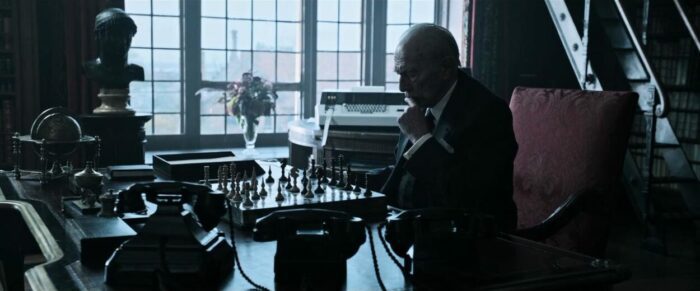
After the commercial success of The Martian in 2015, Ridley Scott once again tackled a crime thriller film with the true story of the 1973 John Paul Getty III kidnapping in All the Money in the World. Scandal would add turmoil to the production, after Kevin Spacey’s sexual misconduct allegations two months into filming. Stepping into the role of billionaire oil-tycoon Getty would be veteran actor Christopher Plummer, whose performance garnered an Academy Award nomination. Although the film was received well enough by the critics, audiences didn’t reward the film at the box office enough amid the production chaos. It’s really too bad All the Money in the World. didn’t get more attention, because it’s a well made thriller that shows Scott doing what he does best: tell a compelling story in an entertaining fashion.
Plummer is fantastic as the wickedly shrewd and diabolical billionaire Getty. Some clumsy writing/editing in the first act establishes the complicated Getty family dynamic, but the narrative picks up pace after the kidnapping of Getty III in Italy. After he is kidnap and held for ransom by Italian gangster who ask for $17 million from the Getty family, the real contention heats up. Paul’s mother (Michelle Williams) pleas with her ex-father-in-law to help get him back, but the greed of Getty who is consumed by his wealth reveals him as antagonist as well.
With the sharp performance Scott illustrates his central theme: what if extreme wealth dehumanizes someone so much they can only love objects instead of people? (Citizen Kane, anyone?) Mark Wahlberg also delivers as Getty’s head of security, who eventually can’t hold back his contempt for the situation as well. All the Money in the World showcases what Ridley Scott can create with compelling material and a competent cast—even late in his long career.
9. Napoleon (2023)
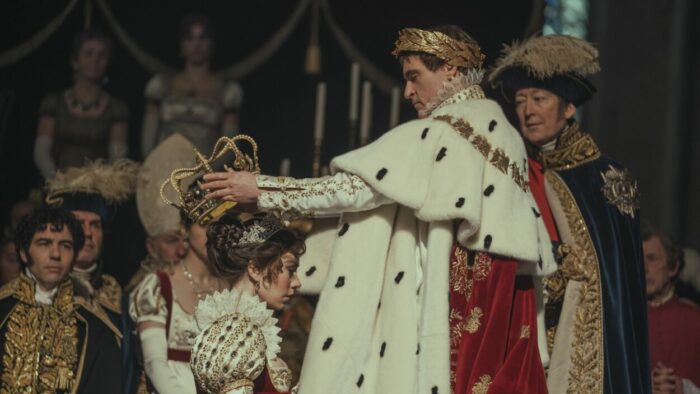
After their success with 2000’s Gladiator, Ridley Scott and Academy Award winner Joaquin Phoenix teamed up once again, more than two decades later, for another historical epic. Napoleon aspires to a production scope and grandeur to match the life of French Emperor Napoleon Bonaparte himself. “France… Army… Josephine”—the final worlds of Napoleon—imply the three loves of the emperor’s life and the focus of Scott’s film; showcasing how his love of country, military success, and complex marriage shaped an imperfect man.
Scott’s Napoleon is as imperfect as Napoleon Bonaparte’s rise and fall in the late 18th/early 19th century. But it bears all the hallmarks of the director’s work. Production value is as impressive as any of his epics. Phoenix and Vanessa Kirby give excellent performances showing the complicated love shared between emperor and empress. Phoenix, in particular, showcases Napoleon’s insecurities and egotism. His relationship to his mother and his inability to conceive an heir with his wife bleed into his want to conquer all of Europe. Napoleon’s love of France comes as his savior to save it from itself, from enemies foreign and domestic.
Napoleon is at its stirring best when it stages six of Napoleon’s battle sequences, the greatest of them being the Battle of Austerlitz. Here, Scott displays Napoleons’ sharpness as a military strategist in collaboration with DP Dariusz Wolski to create a grounded and realistic battle at the edge of a frozen lake where France battles both Austria and Russia. Swords, horses, and cannon fire reach the edges of the frame with an intensity few directors can create. The fires of Moscow burn in the distance as Napoleon’s greed drives his army to the brink of death and exile.
But when Napoleon‘s tone swings between scenes of his command of the military and his flaws as a husband and politician, Scott’s most recent film seems less sure of itself. Rumors of an even longer cut of the film to come make one wonder if there’s a better Napoleon we’ve yet to see.
8. The Last Duel (2021)
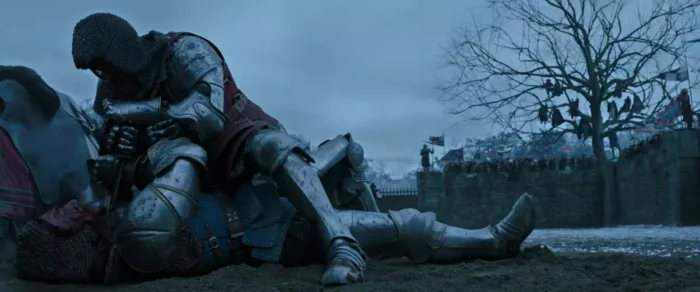
On its surface, The Last Duel appears another action-packed swords-and-sandals epic from Ridley Scott, but it subverts those expectations for a more interpersonal melodrama. Set in 14th century France, Sir Jean de Carrouges (Matt Damon) marries Marguerite (Jodie Comer) to eventually inherit her fathers land and improve his station as a knight in the french army and land owner. He eventually disputes Count Pierre d’Alencon (Ben Affleck) over land, who is also grooming squire Jacques Le Gris as a favorable book keeper and rival of Jean. Due in part to the Coronavirus pandemic, The Last Duel performed poorly at the box office but was received favorably by critics. Critics appreciated the narrative conceit that centers the film, a Kurosawa-eqsue Rashomon style of story telling. Scott decides to tell the conflict from three different perspectives in the story.
First of theses is de Carrouges, who discovers that his rival Le Gris allegedly raped his wife Marguerite, and he takes it as disrespect to himself. Next the perspective of Le Gris plays out, showing his desire for improvement in life as he makes allegiance with the Count. He makes advancements on Marguerite thinking she is not loyal to Jean. Marguerite’s perspective is also shown, living in a cold world as property to her husband, struggling to give him an heir. Her perspective shows the unwanted advancements of Le Gris and subsequent rape in the brutalist fashion. After some judicial procedure, it is decided the two men will fight to the death in a joust/sword duel (shot incredibly well). God will decide the truth and decide justice for the men and Marguerite.
Scott brings all his skills as a craftsman as the film looks and sounds period accurate with top notch cinematography and production design. He leans into great performances of his actors per usual, a necessity for a story that leans this heavy into narrative drama. The Last Duel exemplifies Ridley Scott on a hot directorial run late in his career.
7. Prometheus (2012)
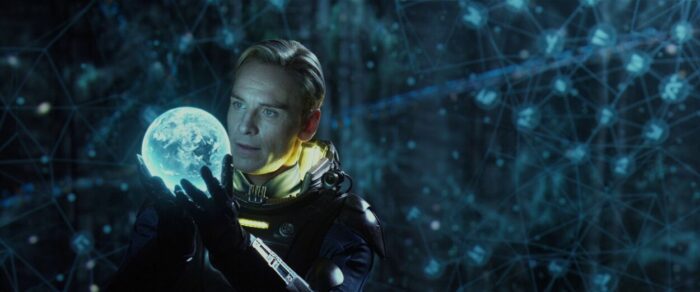
When it was announced that Ridley Scott would be making a prequel to Alien, one of his most beloved films, there was equal parts excitement and skepticism. Does the Alien franchise need more backstory? Shouldn’t he leave well enough alone? Both fair questions, but luckily Prometheus does just enough exploration of the Alien universe without undoing that which should be left unanswered. Prometheus works for me because of the performances, the tone, and the updated technology Scott gets to play with.
In 2093, the crew of the ship Prometheus are tasked by the Weiland Corporation with exploring a far away planet that is highlighted by “star maps” by several different ancient civilizations. It is there they hope to find answers to foreign “Engineers” who may have created the human race, and perhaps find answers to longer life. The cast of Prometheus follows a trend of A-list actors and emerging stars signing on to a Ridley Scott project. Charlize Theron and Idris Elba highlight the supporting characters, with Noomi Rapace and Michael Fassbender shining brightest. Fassbender plays the android David, who follows in the curious and scheming footsteps of previous androids in Scott’s early hits Alien and Blade Runner.
Fassbender’s David represents sci-fi’s contentious relationship between AI and humans, and letting him loose on the narrative brings home all the themes of mankind’s danger in space and vs. nature. Open arriving at the foreign planet the crew discovers that the “Engineers” created a deadly black substance to take to earth and destroy life there. Desperate for answers, they persist instead of leaving and all pay the price in one form or another. The black substance infects and infiltrates various crew members, giving host the the evolution of xenomorph’s alien creatures made famous in the franchise. Prometheus doesn’t quite reach the iconic heights of its 1979 franchise starter, but it highlights all of Scott’s filmmaking trademarks and sets him on a new course of bold choices in the 2010s and beyond.
6. Kingdom of Heaven (2005)
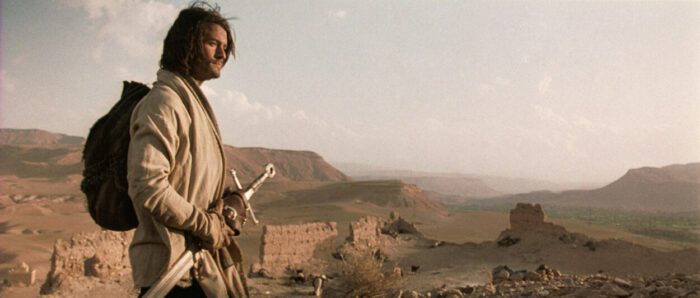
Following the commercial and critical success of Gladiator, Ridley Scott again stepped into the sword-and-sandals genre. Kingdom of Heaven quietly came and went in May 2005 without much initial cultural impact like its aesthetic predecessor. A victim of studio interference and conflicting visions with director Ridley Scott (as has happened before with Alien and Blade Runner), the film was nearly forgotten about. A director’s cut for the film was released for home video consumption, and critical reception instantly flipped. A longer runtime allowed scenes to flow better and the epic scale of the story and production to shine. Kingdom of Heaven features all the highlights of what makes Scott a great director: bold production values, location shooting, actors giving their best, beautiful cinematography, and an effective musical score.
Set in Jerusalem during the 12th-century crusades, Kingdom of Heaven wraps a hero journey tale inside the political arena of war vs. peace. Fresh off his success in the Pirates of the Caribbean and Lord of the Rings franchises, Orlando Bloom gives a solid performance as Balian. Going from blacksmith to savior Knight, he has to balance the tides of war in the Holy Land between the anti-Muslim Templar Knights and Sultan Saladin. He does so with the wise guidance of his late father (Liam Neeson), lover Princess Sibylla (Eva Green) and dying King Baldwin IV (Edward Norton). Mixed within the drama are period realistic battle sequences that few directors can stage like Scott does. Cinematographer John Mathieson reunites with Scott from Gladiator to compose rich images yet again. The director’s cut—the version Scott swears by—makes Kingdom of Heaven an underrated gem and one of his best films.
5. Thelma & Louise (1991)
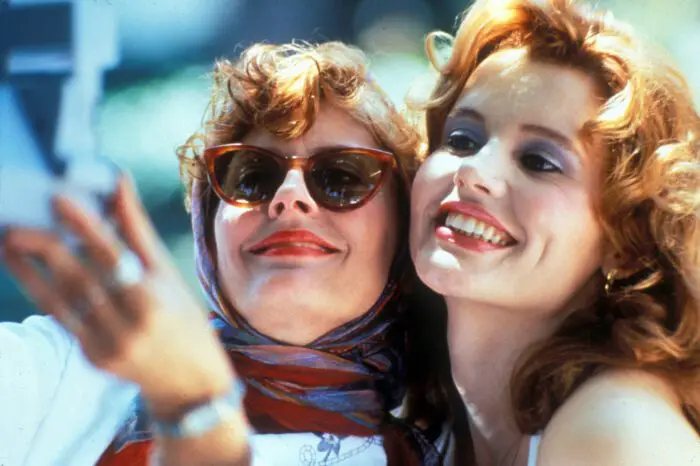
Thelma & Louise is an interesting outlier in Ridley Scott’s filmography. While plenty of his films have strong female characters, even a few of them as protagonists, Thelma & Louise is unquestionably centered around lead female characters. Scott catches Geena Davis and Susan Sarandon each in an upward trajectory of their careers, and they shine as two Arkansas women on a road trip who become outlaws by circumstance. The film has a touch of dark humor to it, flashes of what the Coen brothers would best become known for. Scott composes some beautiful images, using the Oklahoma and New Mexico landscapes as backdrop for a western/road film channeling John Ford.
Thelma & Louise is about two women fed up with the harassment and abuse suffered at the hands of the men in their lives. Each of the leads has deadbeat or dead-end partners they’re eager to leave. An encounter with a stranger at a roadhouse bar turns dark and violent as Louise has to brandish a gun to ward off a rape-in-progress involving Thelma, and the subsequent trigger pull sends them out on the lam. Thelma puts her trust into the good looks and charm of drifter J.D. (Brad Pitt’s big debut!), but things go from bad to worse from there.
Ironically, the only decent male in the film is the detective played by Harvey Keitel. Known as a tough guy in Scorsese and Tarantino films, Keitel is portrayed here with empathy, trying to do his job but also help the two female outlaws. Thelma & Louise fits firmly in Scott’s Top Five for me, highlighting all of his trademarks; strong performances, well composed cinematography, adding up to enticing drama.
4. The Martian (2015)
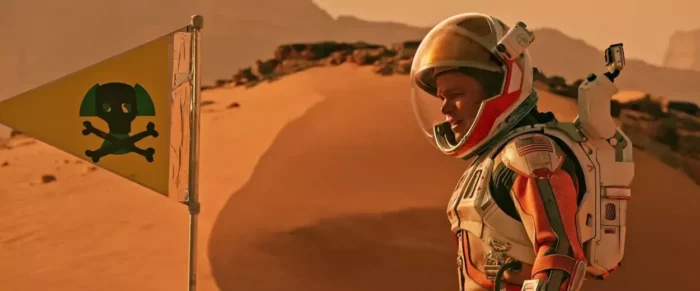
As filmmaking technology made strides around 2010, Hollywood auteurs started turning out some great films set in space. The year 2013 featured Aflonso Cuaron’s Gravity and 2014 Christopher Nolan’s Interstellar, both great films in their own ways. The year 2015 would follow that trend with Ridley Scott adapting a hit 2011 novel titled The Martian. The pitch is simple: Matt Damon as an astronaut stranded on Mars, fighting for survival and sci-fi guru Ridley Scott behind the camera. Audiences loved The Martian, netting it $600 million at the worldwide box office, and it was a critical darling to boot.
The Martian is a perfect blend of a feel-good science fiction tale with veteran craftsmanship. Not too different from Cast Away (2000) in concept, The Martian shows the lengths to which a human will go to fight for survival. Mark Watney is not the only one shown to make said sacrifice as an astronaut who is accidentally left for dead by his crew, as they also are involved in a mission to rescue him with the help of countless professionals on earth. Dressed in the icy cold and deadly indifference of space, Scott uses the charm of Matt Damon’s great performance as Mark Watney to diffuse and inject life into the dire situation. Damon uses a daily video log to work out problems that arise on Mars, often punctuating scenes with biting sarcastic humor.
Damon’s lead performance is crucial to the film to work and as often happens in Scott’s films, the lead just crushes the role. Just as important is the ensemble supporting cast: Jessica Chastain, Jeff Daniels, Kristen Wiig, Chiwetel Ejiofor, Sean Bean, Michael Peña, Kate Mara, Sebastian Stan, Donald Glover, and Benedict Wong round out another well acted film for the veteran film maker. The vast vistas of mars are created by frequent collaboration with DP Dariusz Wolski. The soundtrack by Harry Gregson-Williams excites and moves, as well as cheeky use of songs like David Bowie’s “Starman.” All these factors add up to Ridley Scott’s best and most satisfying film of the last 20-plus years.
3. Blade Runner (1982)
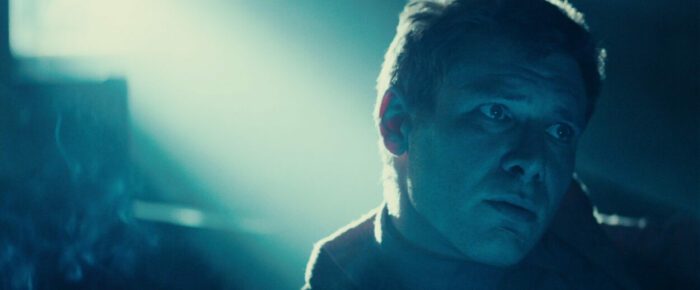
There is much that can be said about the impact of Blade Runner, both when it came out and the importance it has had on the sci-fi genre the last four decades. I appreciate it most as a perfect blend of genres, combining the great questions and themes of sci-fi with the aesthetic of a breakthrough neo-noir. Fresh off his hit sci-fi/thriller Alien, Ridley Scott was set to innovate yet again with an adaptation of Philip Dick’s 1968 novel Do Androids Dream of Electric Sleep? The theatrical version had narration (a noir theme) that the studio insisted, and the cut wasn’t how Ridley Scott initially wanted it to be. It has mixed reviews initially from critics and the public, but a cult following has emerged especially with director and final cut editions of the film of the years.
Harrison Ford stars as Rick Deckard, a designated “blade runner” cop whose job is to find and kill (they call retire) rogue replicants. Replicants are androids created with the likeness of humans, sent off to off-world colonies to do slave work for the Tyrell corporation that created them. When a group of them rebels and comes back to dystopian/futuristic L.A. looking for answers to longer life from their maker, it is up to Deckard to kill the remaining replicants. Ford is cast during the height of his stardom with the Star Wars and Indiana Jones franchises. As Deckard he suppresses the sarcasm and charm of those two characters for a more clinical and cold approach, much like a hard-boiled detective from a 1940s film noir. Rutger Hauer as the lead replicant “Roy Batty” gets the juiciest role in the film, as his bleached blonde hair and intense glares search for answers from God/The Father Eldon Tyrell.
The production design for Blade Runner remains tremendous, even decades after its release. The Tyrell corporation is housed in towering temple-like buildings above a decaying city below. Flying cars traverse a dark and neon-lit cityscape, usually drenched in rain and shadows. Jordan Cronenweth’s cinematography perfectly understands the assignment of sci-fi film in noir setting, with high contrast lighting in every interior and a blue hue from the neon lights glowing in through the venetian blinds. The musical score by Vangelis combines the structure of classical music with the vibes of a futuristic synthesizer. The film hits its zenith in the third act, with Deckard and Roy Batty having a final cat-and-mouse showdown. Hauer chews the scenery as he chases Deckard up a building, culminating in a final philosophical verbal joust on death’s front door. Overall, Blade Runner deserves its place as an innovative sci-fi neo-noir that showed what was possible for futuristic dystopian films, and is one of the best films to Ridley Scott’s credit.
2. Gladiator (2000)
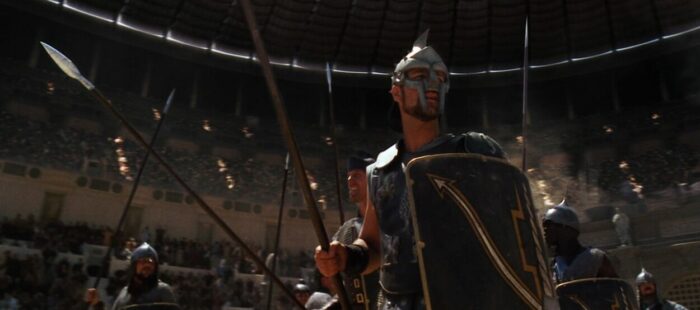
When it comes to historical epics, Ridley Scott peaked with the 2000 Best Picture winner Gladiator. Per usual with his historical dramas, Gladiator blends true events and characters with a dash of fiction to spice up the narrative. Russell Crowe stars (and wins a Best Actor Oscar) as Maximus, General of the Roman army seeking revenge for betrayal by Emperor Commodus (Joaquin Phoenix). After being denied succession to the throne, Commodus performs a coup by killed his dying father Marcus Aurelius (Richard Harris). Maximus survives but finds his wife and son murdered, and he is imprisoned on the outskirts of the Roman empire as a sword-fighting gladiator. After gaining respect and working his way back to the Roman Colosseum, he vows revenge on the immoral Emperor.
All the Ridley Scott touches are in place with this production. Location shooting brings a sense of realism and verisimilitude to second-century Europe. The sets and costume design reflect this as well, and the tone of the film discards indulgence of the 1960s sword-and-sandals epics of Hollywood. The performances are top notch and what you would expect in a Ridley Scott film of this caliber, carried by Crowe and Phoenix. The action sequences in Germania, gladiator pits, and Roman Colosseum are shot with verve and ground the action to the story.
Gladiator is perhaps Ridley Scott’s biggest mainstream achievement. It earned $500 million at the worldwide box office, won the respect of critics, and took home five Academy Awards. The film ushered in a slew of historical epics like Troy (2004), Alexander (2004), and Scott’s very own Kingdom of Heaven (2005). Next to none that followed could match the prowess and impact of Gladiator. John Mathieson’s stunning cinematography and Hans Zimmer’s electric score highlight an aesthetic that defines Ridley Scott’s work in the 21st century.
1. Alien (1979)
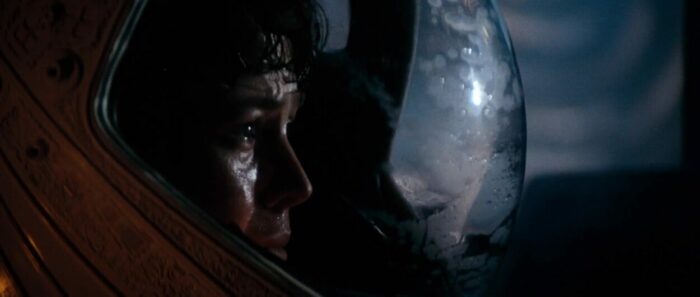
Before the 1970s, sci-fi space thrillers were a fairly niche genre to which studios paid scant attention. However, the grand success of Star Wars in 1977 opened the doors for new possibilities. Pitched to studios as “Jaws in space” Alien screenwriter Dan O’Bannon finally found a suitor for a darker vision of a sci-fi space film. Leading production would be a then unheralded up-and-coming English filmmaker. whose work would yield a classic: the sci-fi/horror masterpiece Alien.
The concept of Alien is fairly simple. Upon waking from a long space voyage on a mission as a space tug, the crew of the Nostromo receives a distress signal from a nearby moon, where they locate an alien space jockey craft with no evidence of survivors. When they discover a cargo load full of eggs, one of the crew members is attacked by a small creature that brings about a deadly force. Kane (John Hurt) is first plagued by a facehugger formed creature, that then shocks the crew in the infamous “chestburster” scene.
The abject horror of the evolving xenomorph creature exploding out of Kane’s chest terrifies the crew and audience alike. The genius in the execution of the story is the production design. Ridley Scott uses the gothic design of H.R. Giger to develop the grotesque and frightening look of the black alien xenomorph. The tension in the film builds as it evolves in size and shape, hiding in the shadows and praying on the fears of the literal unknown. The crew and audience are both betrayed when Ash (Ian Holm) is revealed to be an android, whose mission is to get the deadly creature back home to earth at the expense of the crew if necessary.
Alien had a positive if mixed reaction at the box office and critically, but has since in hindsight been lauded as a turning point for both the horror and sci-fi genre. It is a perfect blend of two adjacent genres, and a showcase of Ridley Scott’s talent as a film maker. Few can create the visual imagery or conjure the atmosphere the way he does in this film. The musical score from Jerry Goldsmith is iconic and pulsates along with the tension from scene to scene. A now veteran cast of actors carry the dramatic weight of the film; highlighted by Sigourney Weaver, Ian Holm, and John Hurt. Alien thrust Ridley Scott into the auteur limelight, and it fits a rare case of a film makers best film being very early in their career. All the masterstroke touches in Alien can be found in the rest of his filmography, but few are as cohesive and vibrant like the 1979 sci-fi horror classic.
Honorable Mention
Ridley Scott’s other work often has its moments but fails to connect in the ways his best films can. G.I. Jane (1997) has good performances from Demi Moore/Viggo Mortenson and some grounded drama but ultimately becomes forgettable. Hannibal (2001) suffers from a poor script but it watchable thanks to Scott’s directorial flourish and good performances. Black Hawk Down (2001) is a good war film with a solid cast and some harrowing action that suffers from feeling like one long action scene. Matchstick Men (2003) is a refreshing change of pace for Scott with a clever script and charming performances. American Gangster (2007) is a watchable movie with good performances but feels like it should have been better. Robin Hood (2007) has some good action scenes but feels too much like Ridley Scott rehashing Gladiator into a story it shouldn’t be. House of Gucci (2021) had potential but feels overlong and indulgent.
Final Say
Ridley Scott may not be consistent as some peers during his era (say, for instance, Martin Scorsese), but he has been capable of reaching genre and period highs with the best of them. He can get great performances out of casts. He can shift between large scope epics that “feel” large with old-school filmmaking techniques and interpersonal dramas. He shoots on location, with tremendous set pieces at times, and can make a sci-fi epic in a studio if need be. He can shift gears and feature heroines in lead roles for Alien and Thelma & Louise. He has a large filmography, and it is full of both hits and misses. Luckily, when he hits he really hits. Ridley Scott is not afraid to fall, and has taken take bold swings throughout his career. In a world where “safe” and “profitable” studio films rule, at age 85 Ridley Scott continues to make his own films his own way.



